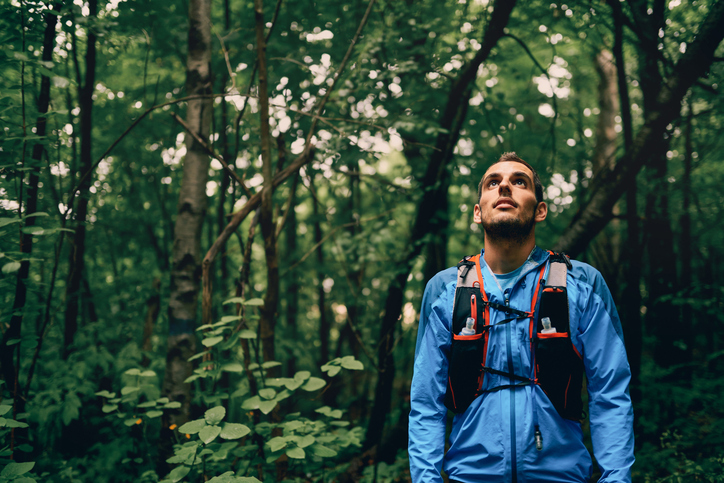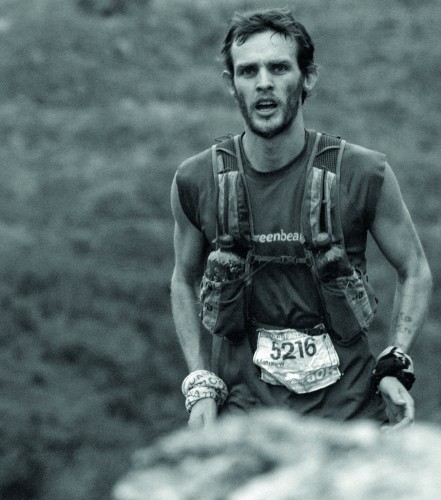
iStock.com / julief514
Certain vintages of runner will remember the old platform computer games. As you navigated through pixelated obstacles, there was the shrinking health bar at the bottom of the screen.
Trail runs can sometimes suck the life out of you in the same way. Collecting little green mushroom won’t help. But topping up regularly with water will definitely give you a 1-UP.
Here’s how to take your hydration game to the next level.
Why do runners need water?
Water is in every single cell of the body. If somehow we suddenly lost it all mid stride, we’d be nothing but a pile of sportily decorated dry bones, and perhaps an iPhone, on a footpath somewhere.
Thankfully that’s not likely to happen. But water is leaking out of us all the time. Every mile a 72kg man will sweat approximately 150ml on a fair weather day.
This escaping fluid is what keeps us cool. According to some evolutionary experts, it is also what once distinguished us as the hunters from the hunted. Our special thermostat meant we could literally run to death any animals who lacked this ability.
How much should runners drink?
The only downside to our remarkable water works, is we need to constantly keep topping up. Estimates for how much water an average male should drink each day are as high as 3.7litres. And that’s before any exercise.
To reach this hydration target, try this trick: begin your day with a good (200ml) slurp from the tap, then fill a 500ml bottle to the top and grab seven elastic bands. As you finish and refill each time throughout the day, add an elastic band to the bottle, aiming for seven bands by bed time.
Disarm any strange looks from colleagues by inviting them to join your drinking game. You can also add isotonic powder or tablets to a few of your refills.
Be careful though: excess water in its mildest form will mean you waste time urinating. At its most serious, it can cause brain swelling, seizures or even death. Hyponatremia has killed more runners than dehydration.
But I don’t even like water
Hydration is not all about the clear fluids. It’s not even just liquids. 90% of strawberries, watermelon and cantaloupe (regular melon) are made of water. Chopped up and stuffed in zip-locking bags in your rucksack they make a great trail snack.
Flat cola is also a great choice when drunk alongside water. The fructose and the caffeine have a double pick you up.
Make your own energy drink
Isotonic drinks help replace the minerals lost in sweat. The most important is sodium.
– 250ml juice
– 250ml tap water
– 1/4 tsp salt
– No preservatives or flavourings necessary.
Even simpler, grab a bag of salted crisps or almonds for the trail to keep your sodium levels high.
For recovery, you can raise a glass to recent findings that drinking up to 660ml (about a pint) of moderate strength beer has no negative effect on hydration levels. Be sure to take on water as well.
How to carry your liquids when running
Bottles are more practical for runners than hard to refill and clean bladders. A proper sized 300ml bottle is a minimum. For local runs lasting between 45-120mins, you could try a 500ml handheld bottle.
Want to go hands-free? Try a hydration belt. Beyond 120minutes and you will want a rucksack for extra water and kit. Bottle accessibility in chest-mounted or easy to reach side-pockets will encourage regular drinking.
Trail drinking rules
Take two good gulps (approx. 125ml) every 15minutes (roughly every mile when running off-road.) However, whenever thirsty, drink. If it is warm, drink more. If you weigh yourself after a run and have lost considerable weight, hydrate, and drink more water on the trail next time.
In a race, learn the terrain and distance between water stops. Fill up tactically so your two-gulp strategy will get you to the next aid station or mountain river or waterfall.
Keep your Bottle
- Nathan SpeedDraw Plus Flask – £18.98 each from Amazon.
Adjustable hand strap with handy pocket for snacks and keys. - Nathan Trail Mix Hydration Belt – £32.48, from Amazon.
Two 300ml bottles, spread nicely across your back to reduce bounce. - Ultimate Direction SJ Ultra Vest 3.0 Canyon – from £65.00 at Amazon.
Comes with two 500ml bottles with chest mount or side mount options. Check size chart carefully.






